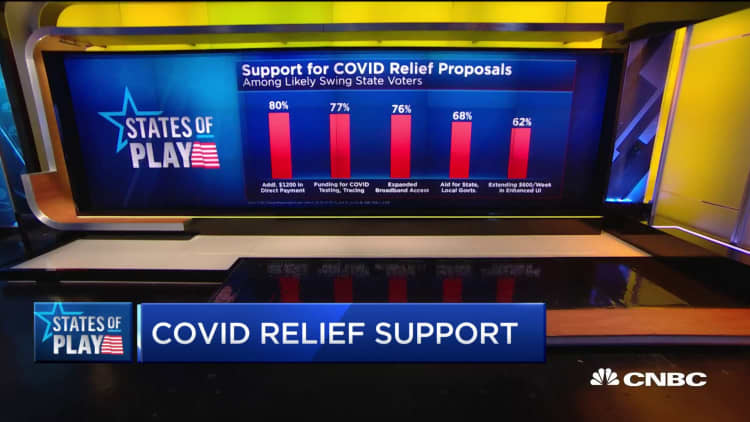Republicans and Democrats appeared far from striking a coronavirus relief deal Wednesday as millions of Americans wait to see whether Congress will renew financial lifelines during an ongoing economic and health crisis.
As negotiators cite little progress in talks and congressional leaders snipe at one another on Capitol Hill, the Trump administration again raised the prospect of a short-term plan to address only enhanced unemployment insurance and a federal eviction moratorium while the sides hash out a broader bill. Democrats have repeatedly rejected a temporary fix.
"We're nowhere close to a deal," White House chief of staff Mark Meadows said Wednesday after a meeting with Treasury Secretary Steven Mnuchin, House Speaker Nancy Pelosi, D-Calif., and Senate Minority Leader Chuck Schumer, D-N.Y., according to reporters at the Capitol.
Earlier, Mnuchin said President Donald Trump would support approving short-term legislation to allow more time for talks if the parties fail to strike an agreement before Friday. The enhanced $600 per week federal unemployment benefit technically expires that day.
"We're not accepting that," Pelosi told reporters after the meeting, saying she wants a "comprehensive" bill.
Comments from congressional leaders and White House officials portrayed a messy, politically charged process that appears unlikely to lead to a quick breakthrough to combat an economic and health-care calamity. As roughly 30 million people still receive some form of unemployment insurance, states have stopped paying out the extra jobless benefit. A federal eviction moratorium also expired last week.
As Covid-19 spreads throughout the country, the U.S. has now reported more than 4.3 million cases and more than 150,000 deaths related to the disease, according to data compiled by Johns Hopkins University.
Senate Republicans released a roughly $1 trillion pandemic aid bill this week, a counter to the $3 trillion package House Democrats passed in May. But the proposal has not earned the support of many GOP lawmakers, let alone Democrats.
As his administration works with Pelosi and Schumer to craft a plan that could pass both the GOP-controlled Senate and Democratic-held House, Trump downplayed the importance of resolving issues other than the jobless benefit and eviction moratorium.
"We're going to work on the evictions, so that people don't get evicted. We'll work on the payments for the people. And the rest of it, we're so far apart, we don't care. We really don't care," the president told reporters before he left for Texas on Wednesday.
He claimed that "the Democrats aren't taking care of the people. The payments aren't enough."

Democrats have pushed to send significantly more money to Americans than Republicans have. They want to continue the $600 per week federal unemployment insurance boost into next year. The GOP has proposed to cut the benefit to $200 per week through September, then change it to 70% wage replacement.
Democrats' plan for another round of direct payments to Americans also differs from the Republican bill. It would send another check of up to $1,200 to most individuals, and $2,400 to couples. The plan would add another $1,200 per dependent for up to three children, a maximum of $6,000 per household.
The Republican legislation would send checks of up to $1,200 to individuals and $2,400 to couples, with $500 per dependent of any age.
The GOP and Democrats are trying to resolve several other thorny issues in the legislation. Republicans did not put any new direct relief for state and local governments in their bill, while Democrats want nearly $1 trillion in aid.
Republicans have also pushed for broad liability protections for companies, doctors and schools during the pandemic, a provision Democrats oppose. On Tuesday, Senate Majority Leader Mitch McConnell, R-Ky., told CNBC that "no bill will pass the Senate that doesn't have the liability protection in it."
After a meeting with Mnuchin and Meadows on Tuesday, Pelosi said the comments about legal immunity made McConnell sound "like a person who had no interest in having an agreement."
The shots continued Wednesday. Speaking on the Senate floor, McConnell accused Democrats of posturing and threatening the extension of key aid measures.
"Democrats would rather keep political issues alive than find bipartisan ways to resolve them," he said.
Schumer then criticized Republicans for putting together a plan that many members of the GOP do not support. He said it was "littered with corporate giveaways" and "presidential pet projects," but did not include key aid such as rental, mortgage and food assistance.
He also accused McConnell of operating in bad faith.
"Time is short," Schumer said. "Speaker Pelosi and I will be back at the negotiating table with the White House later today. It's time for our Republican colleagues to roll up their sleeves and get serious as well."
Correction: The U.S. has now reported more than 4.3 million cases and roughly 150,000 deaths related to Covid-19, according to data compiled by Johns Hopkins University. An earlier version misstated the figures.


